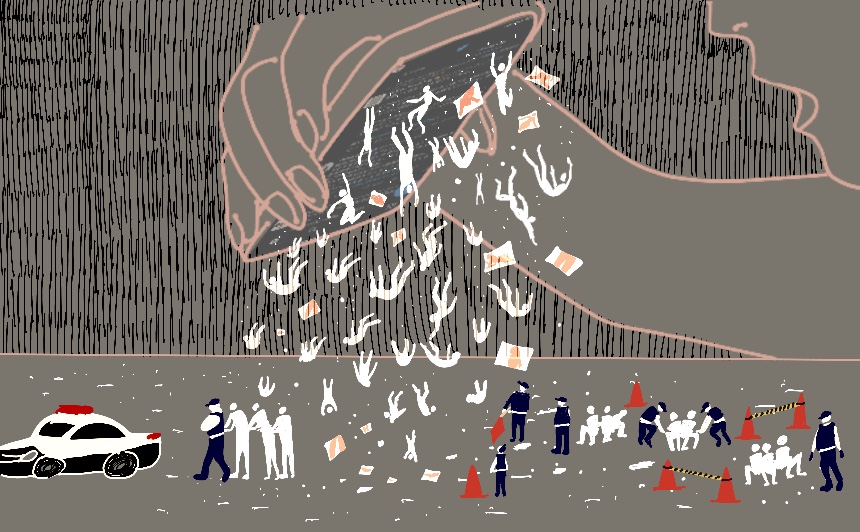“Offense of photographing or filming” enacted — the taking and spreading non-consensual, sexually explicit images has been criminalized (13)
2023.07.20 13:48 Mariko Tsuji
This article is intended to help victims of such crimes by explaining what acts are now punishable.

(Illustration by qnel)
On July 13, 2023, Japan enacted a new law that punishes photographing or filming a person in a sexually explicit manner without their consent or after falsely assuring them that others will not see the images (hereafter “offense of photographing or filming”). Sharing the photographed material or retaining it for the purpose of sharing with others is also a crime.
The law criminalizes some of the kinds of harm reported in this investigative series, “Uploaded and Re-Uploaded.”
Victims who, up to now, had no recourse but to cry themselves to sleep may now be able to hold perpetrators legally responsible. For anyone currently being harmed by the taking or dissemination of non-consensual, sexually explicit images, this article is intended to help you understand the new law.
Article 1 of the new law states that it is intended “to prevent the occurrence and spread of damage caused by the act of photographing or filming sexual acts, etc.”
Specifically, the perpetrator’s conduct is punishable by law if the subject suffers the following.
1. Photographed or filmed without subject’s knowledge or consent
If an individual’s naked sexual parts or performance of sexual acts are photographed or filmed without their knowledge or consent, the perpetrator’s conduct constitutes the “crime of photographing or filming a sexual act, etc.” The law applies even if the subject is wearing underwear.
Previously, this kind of crime was addressed through measures such as prefectural nuisance prevention ordinances, but now a standardized, nationwide regulation has been established.
Perpetrators may be subject to imprisonment for up to three years or a fine of up to 3 million yen (about $21,600).
2.Photographed or filmed in a sexual manner by an acquaintance or partner
Cases in which an individual consented to sexual acts but not to them being photographed or filmed fall under the “crime of photographing or filming a sexual act, etc.,” as described above.
It is also a crime to photograph or film someone when it is impossible for them to give free and informed consent, such as if an individual is assaulted, threatened, under the influence of alcohol or drugs, asleep, or unconscious.
It is also illegal to take photos or videos under false pretenses, such as claims that the images are only for personal use or that the content being filmed or photographed does constitute a sexual act.
Even in situations where the subject has consented to be filmed or photographed, non-consensual dissemination of said images or sharing them with another individual for the purpose of dissemination constitutes a crime under the “Revenge Porn Prevention Act.”
3.The spread of sexually explicit images taken without the subject’s consent
Knowingly spreading voyeuristic or otherwise non-consensual, sexually explicit images to a specific person or small group of people is punishable by up to three years in prison or a fine of up to 3 million yen (about $21,600).
Providing them to unspecified, numerous people or posting them to readily accessible social media or message boards carries an even heavier penalty of up to five years in prison or a fine of up to 5 million yen (about $36,000).
It does not matter whether or not money was paid for such images. Even in the case of a secondary or tertiary sharing, in which the person who received the images provides them to another person, each individual is subject to punishment.
Retention of such images for the purpose of sharing them or otherwise making them public is also prohibited and is punishable by imprisonment for up to two years or a fine of up to 2 million yen (about $14,400).
Illegally photographed or filmed images can be confiscated from anyone, even if the person possessing them was not the original perpetrator.
However, “simple possession” not for the purpose of further sharing is not punishable unless the person photographed is under the age of 18.
4.Livestreaming and screen recording without consent
Livestreaming or otherwise transmitting voyeuristic images without the subject’s consent to multiple, unspecified people is also prohibited and is subject to imprisonment for up to five years or a fine of up to 5 million yen (about $36,000). Recording using functions such as screen recording is also prohibited if you know that the transmitted images were taken illegally.
Even if a Japanese perpetrator is not in Japan, acts that fall under categories one through four described above can be prosecuted as “crimes committed outside Japan.”
Also necessary for law to apply to companies
With the enactment of the new “offense of photographing or filming,” it can be expected that previously non-prosecutable acts will now be considered crimes and lead to punishment.
On the other hand, I believe that unless the internet users who disseminate non-consensual, sexually explicit images as valuable commodities and the mechanisms that support these transactions change, such crimes will remain basically undeterred.
Companies that operate social media sites and video viewing and sharing sites should take preventive and responsive measures to prevent criminal activity from occurring under their control.
Corporate commitment to this issue is still lacking, and many sites continue to use sexually explicit images to make money. They are still under no legal obligation to remove images that have been spread without the subject’s consent. I will continue to report on this issue.
(Originally published in Japanese on July 13, 2023.)
Uploaded and Re-Uploaded: All articles
 Newsletter signup
Newsletter signup